Notes from the Editors
On March 15, 2011, we received the following letter from Robert W. McChesney, former coeditor of MR and Gutgsell Endowed Professor of Communication at the University of Illinois at Urbana. Bob lives in Madison, Wisconsin, which in February and March, was the site of an intense class conflict over public-sector workers’ rights to organize. We are reprinting his letter in full here, as we think it will be of interest to all MR readers. | more…
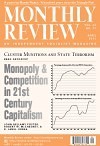
This year marks the forty-fifth anniversary of the publication of Paul Baran and Paul Sweezy’s classic work, Monopoly Capital: An Essay on the American Economic Order (Monthly Review Press, 1966). Three years before the publication of their book, in the July 1963 issue of Monthly Review, Baran and Sweezy published two chapters of Monopoly Capital in MR, together with an introduction. (The publication of the actual book was delayed by Baran’s death in 1964.) Today MR editor John Bellamy Foster and Robert W. McChesney are currently completing a book, entitled Monopoly-Finance Capital: Politics in an Era of Economic Stagnation and Social Decline, to be published by Monthly Review Press early next year. The purpose of this new work is to bring the analysis of Monopoly Capital up to date, addressing the changes that have occurred in the capitalist system in the last half-century. We have therefore decided to follow the example of Baran and Sweezy and publish a number of the core chapters of this book, in early form in the magazine, in advance of the book itself. The March 2011 Review of the Month, “The Internet’s Unholy Marriage to Capitalism,” was one such chapter. This issue’s Review of the Month, “Monopoly and Competition in Twenty-First Century Capitalism“…is another. | more…
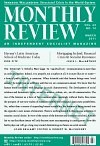
In the United States, it is now three years since the “Great Recession” began, and twenty-one months since it officially ended. Whether or not the end of the Great Recession means that the economy is now on the way to sustained recovery is another matter. Wall Street has rebounded dramatically, as have corporate—and especially financial sector—profits, but for ordinary men and women, circumstances are nearly as troubling today as they were at the bottom of the downturn in June 2009. | more…
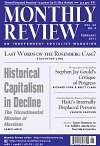
The two lead articles in this issue of Monthly Review are both outgrowths of important new books published by Monthly Review Press. Samir Amin’s article, “The Trajectory of Historical Capitalism and Marxism’s Tricontinental Vocation,” is based on recent developments in his theoretical outlook presented in The Law of Worldwide Value…. A substantially revised and extended version of his earlier work, The Law of Value and Historical Materialism (Monthly Review Press, 1978), The Law of Worldwide Value also incorporates new conceptual breakthroughs, making it a major advance in itself.… The article by Richard York and Brett Clark entitled “Stephen Jay Gould’s Critique of Progress” is taken from their book The Science and Humanism of Stephen Jay Gould…. Gould’s far-ranging work in natural history, biology, and paleontology—even extending to the humanities and the social sciences—has fascinated countless readers, but the complexity of his thought and the extent of his intellectual commitments have defied previous attempts to bring out the unity of his work. | more…
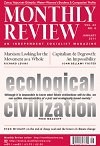
In November, Fred Magdoff traveled to Shanghai with his wife, Amy Demarest, to attend the Marxism and Ecological Civilization conference at Fudan University (see the Review of the Month in this issue). Here are some reflections from Fred about the conference, Shanghai, and China, past and present | more…
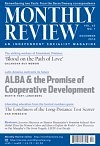
On October 16, MR editor John Bellamy Foster attended a lecture in Eugene, Oregon given by James Hansen, director of NASA’s Goddard Institute for Space Studies. Hansen is the leading U.S. climatologist and the world’s foremost voice for carbon emissions reductions. According to Hansen, we are facing two major tipping points associated with climate change: (1) ice sheet disintegration in Antarctica and Greenland, leading to a massive global sea level rise; and (2) a sudden acceleration in species extinction rates (already 100 to 1,000 times the preindustrial “background rate”), as climate zones begin to move much faster than species can move in response.… Hansen’s message was clear: the future of the planet will be in many ways determined by what we do “in the next several years.” This, he insists, is not a problem to be left to the next generation, since we “could create a situation out of the control of young people by the time they become adults.” | more…
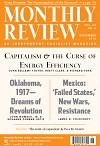
Although the Great Recession officially ended in the U.S. economy more than a year ago (June 2009), for most people—especially the long-term unemployed, minorities, and youth—the effects are far from over. Indeed, it is a measure of the economic malaise in which the industrialized countries remain mired that the specter of stagnation is once again haunting mainstream discourse. As Paul Krugman recently observed, the U.S. economy is experiencing “what looks increasingly like a permanent state of stagnation and high unemployment” akin to the 1930s (“This is Not a Recovery,” New York Times, August 26, 2010) | more…
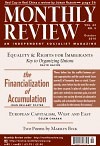
To understand the disaster that is present-day economics, it is crucial to recognize that we are living today, not only in the deepest economic crisis/stagnation since the Great Depression, but also—as Paul Krugman declared in his New York Times blog on January 27, 2009—in “A Dark Age of Macroeconomics,” in which the central discoveries of the 1930s have been forgotten or discarded. “What made the Dark Ages dark,” Krugman wrote, “was the fact that so much knowledge had been lost, that so much known to the Greeks and Romans had been forgotten by the barbarian kingdoms that followed.” The critical knowledge lost that gave rise to the new Dark Age in Macroeconomics, he claimed, was none other than the Keynesian Revolution centered on the critique of Say’s Law, or the notion that supply creates its own demand. In the context of arguing against government deficit spending, leading economists at the University of Chicago, the bastion of reaction in economics, have reverted to a “pure Say’s Law, pure ‘Treasury view’” by insisting that increased savings automatically lead to increased investment, while government borrowing invariably “crowds out” investment | more…
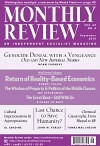
During the period stretching from the 1970s through the 1990s, Monthly Review, under the editorship of Harry Magdoff and Paul Sweezy, stood apart in its analysis of the tendency to economic stagnation in advanced capitalism and its view that the economic slowdown beginning in the 1970s was a manifestation of this secular tendency. The financial explosion that also emerged in these years was seen as an attempt by the system to stave off stagnation by means of credit-debt expansion, but at the cost of increasing financial fragility | more…
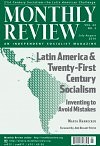
For those wishing to understand the theory and practice of “socialism for the 21st century,” the publication this summer of Michael Lebowitz’s The Socialist Alternative: Real Human Development (Monthly Review Press) is a major event. Like Marta Harnecker, whose work, “Latin America and Twenty-First Century Socialism: Inventing to Avoid Mistakes,” forms the content of this issue of Monthly Review, Lebowitz is associated with the Centro Internacional Miranda research institute in Venezuela, is an advisor to President Hugo Chávez, and is a major Marxian theorist and political economist. He is also author of Beyond Capital: Marx’s Political Economy of the Working Class, and, more recently, Build it Now (Monthly Review Press, 2006) | more…
The World People’s Conference on Climate Change and the Rights of Mother Earth held April 20-22, 2010, in Cochabamba, Bolivia, will undoubtedly be remembered as a major historical turning point in the struggle over climate change. Over 35,000 people from 142 countries attended….For perhaps the first time, the issue of the planetary environmental crisis was wrested entirely from the ideological control of the rich countries of the North in a major international forum, leading to the development of a radical South-based perspective. | more…
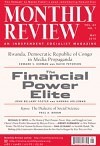
The more serious the problem of climate change becomes, the more revolutionary the change needed to address it—the more we can expect powerful economic and social interests to deny the seriousness of the problem: playing up scientific uncertainties that always exist, and casting doubt on climate science itself. The object of such a response is to manipulate public opinion so as to sow confusion and arrest any attempt to alter business as usual. | more…
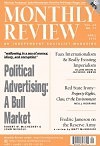
April 10, 2010, marks the hundredth anniversary of the birth of Paul Sweezy (1910-2004), and December 8, 2010, will mark a century since the birth of Paul Baran (1910-1964). Their joint work, Monopoly Capital: An Essay on the American Economic and Social Order ,was published by Monthly Review Press in 1966. Between this month and December, we intend to commemorate the Baran-Sweezy Centennial through items to appear in Monthly Review, MRzine, and the MR Webpage. We will also commemorate this year the work of their close friend and colleague Harry Magdoff, born August 21, 1913, whose writing is inextricably connected to theirs. | more…










